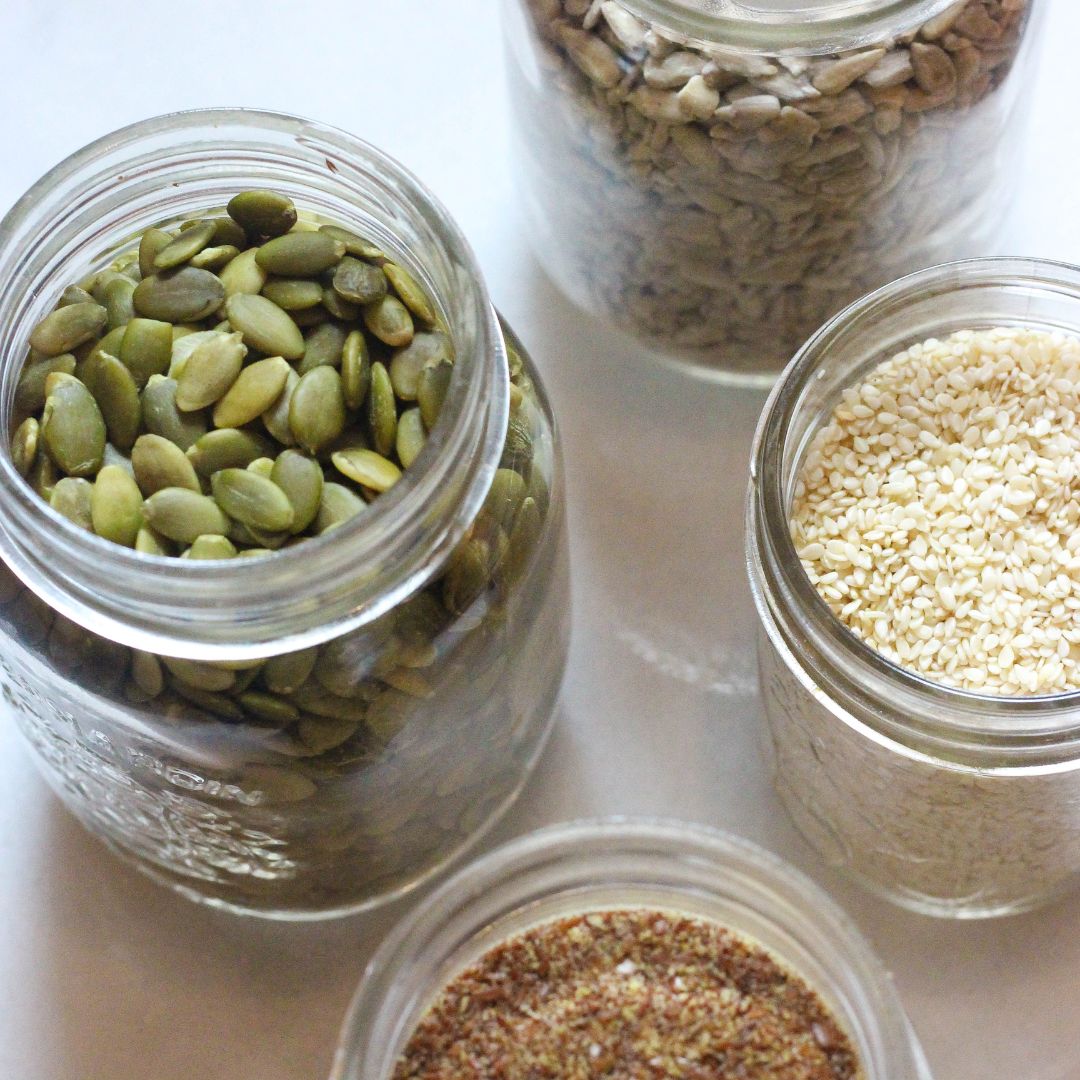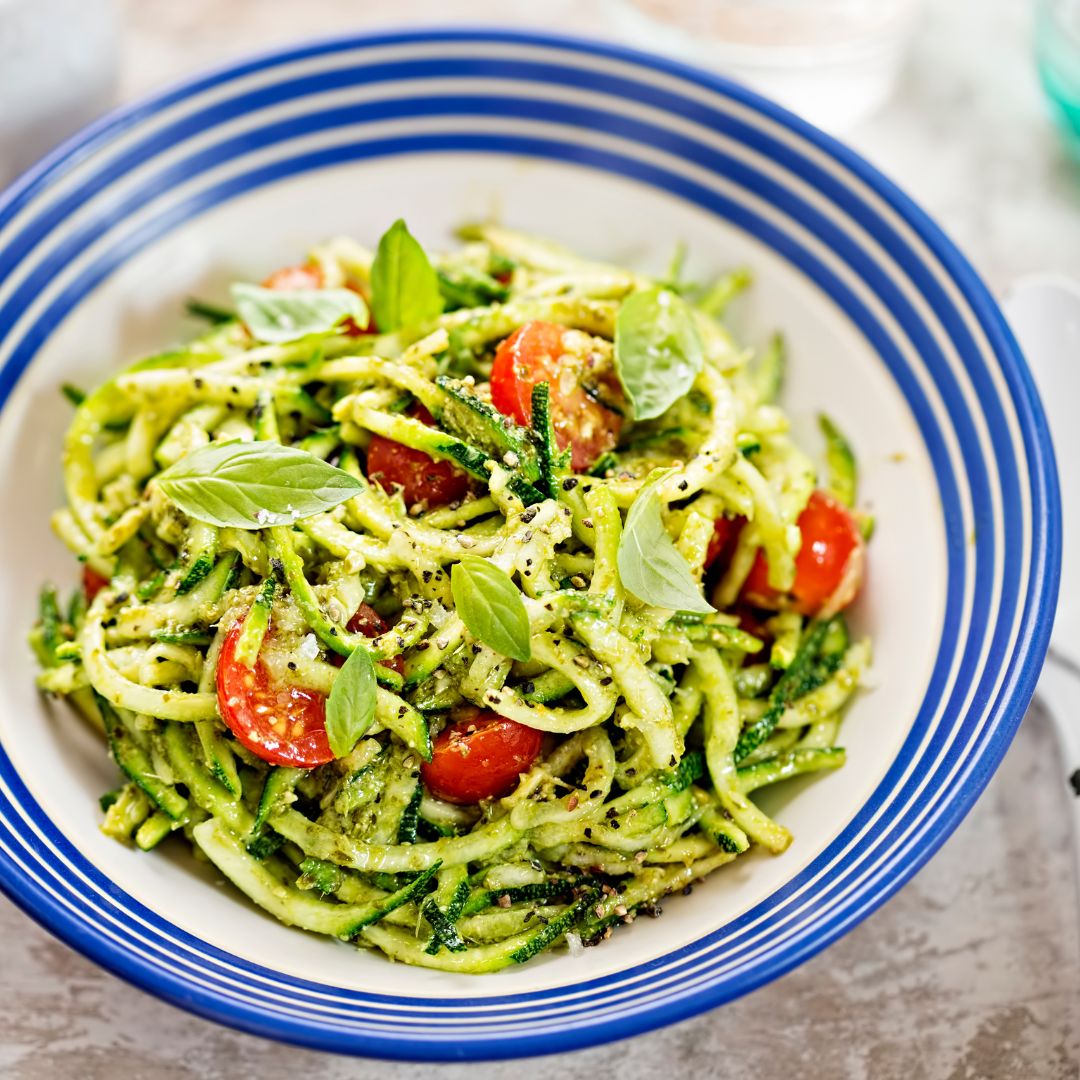
Eat for Your Cycle
A woman’s nutritional needs shift throughout her cycle – and syncing your food to your hormones can be a great way to support mood, energy, and overall wellbeing. Even if you’re irregular or not currently menstruating, you can still follow this rhythm by tracking the lunar cycle as a guide.
Here’s a simplified overview of how to eat to support each phase:
Follicular phase (around 7–10 days after your period ends)
Hormone levels are at their lowest, which makes this a great time to focus on fresh, nutrient-rich foods to build energy and support hormone production.
Go for:
Ovulation (3–4 days mid-cycle)
This is when oestrogen peaks and energy levels are often at their highest. Your body thrives on lighter, vibrant foods rich in antioxidants.
Include:
Luteal phase (10–14 days before your period)
This is when PMS symptoms can kick in – bloating, cravings, low mood – you know the drill.
Prioritise:
Menstrual phase (3–7 days)
Time to be kind to yourself. Your body is shedding and renewing, so focus on deeply nourishing foods that replenish and hydrate.
Think:
Easy tips for balancing hormones:
Seed cycling
Incorporate specific seeds into your daily diet based on your menstrual cycle phase. This supports natural hormone balance by providing targeted nutrients. Add 1 tbsp of each seed to 1 daily meal
Day 1-14
If you’re in the first half of your cycle (Day 1-14 where Day 1 is the first day of your period), add (1 tbsp each) flaxseed and pumpkin seeds to your meals.
Day 15-29
If you’re in the second half of your cycle (Day 15-28), add (1 tbsp each) sunflower and sesame seeds. to your meals to improvs hormonal disturbance in women and promote a healthy life.
Prioritise gut health
A healthy gut microbiome plays a vital role in hormone metabolism and detoxification. Probiotic-rich foods like yogurt, kefir, kimchi, and kombucha help maintain gut balance, while prebiotics in fibre-rich vegetables and fruits feed beneficial bacteria.
Enjoy healthy fats
Healthy fats like avocado, olive oil, nuts, seeds, and oily fish provide essential building blocks for hormones and reduce inflammation. Include them regularly in your diet, choosing cold-pressed oils and unroasted nuts for optimal nutrient retention.
Minimise inflammatory foods
Refined carbohydrates, processed foods, sugar, and excessive alcohol can trigger inflammation, disrupting hormone balance. Opt for whole grains, legumes, fruit, vegetables, and lean protein sources instead.
Support your liver
The liver plays a key role in hormone breakdown and elimination. Foods like cruciferous vegetables (broccoli, Brussels sprouts), beetroot, garlic, and dandelion greens support liver detoxification, promoting efficient hormone processing.
And if you’re struggling with any specific hormone conditions or symptoms, why not book in a free call with me? We can talk through, and I can give you some simple tips to take away. Just book here.

How to Beat Summer Stress
Summer gets some fantastic PR. The very word makes you think of lazy days by the pool, relaxed dining on a balmy evening, sunsets and spritzes, carefree drives in a sporty convertible with your hair blowing in the breeze.
Sadly, that’s not the reality for many of us, working away doing all the usual stuff we have to do in the (sometimes) blistering heat. The real truth is that summer burnout is real – and August might be draining you more than you realise. And, if you’re feeling more frazzled than fresh right now, you’re not alone. This time of year is usually anything but restful.
Let’s break this down, and work out what you can do about it…
Whether you’ve been ferrying kids around, juggling holidays with work, playing hostess, managing family dynamics, or just existing in 30-degree heat with zero patience, it’s a lot. Add the emotional rollercoaster of A-level and GCSE results, and you've got the perfect storm of stress, poor sleep, and emotional exhaustion.
This is summer burnout. And yes, it’s a real thing.
Here’s what might be going on behind the scenes:
If you’re waking up tired, snapping at loved ones, craving carbs like mad, or just feeling off, that’s your body waving a little white flag.
Let’s not pretend you’re about to overhaul your diet, book a yoga retreat and start journalling daily. (Lovely idea, but… life.) Instead, let’s look at a few ways to ease the pressure and gently top your tank back up.
You might be thinking of stress as the inevitable result of a big life event like a house move, divorce or bereavement, but even the steady drip of everyday life is enough. Stress can also be caused by your diet, lack of sleep, environmental toxins - and more. Even winning the lottery can cause stress! Then there’s your physical environment - like summer heat…
So here are some of the ways you can start to redress the balance.
You’re probably more dehydrated than you think, especially if the wine’s been flowing. Aim for 2L-3L water a day, plus herbal teas and hydrating foods like cucumbers, melon, berries and leafy greens.
Add a pinch of sea salt or electrolyte drops if you need more support.
Your body loves routine, not to be boring, but because it supports your hormones, energy and mood. Try:
Focus on meals that are rich in:
This combo helps stabilise blood sugar, which means fewer energy dips, mood swings, and snack attacks.
This one really is the gold. The summer calendar can get pretty packed with weddings, parties and other events as people take advantage of the good weather.
You don’t have to say yes to every BBQ, day trip or family drama. Boundaries are health-giving. Permission granted.
There are a multitude of benefits to being outside. For the purposes of dialling down stress and getting better sleep at night, getting outside in the morning is important.
Even a quick walk in the daylight can help reset your circadian rhythm, that’s the daily rhythm your body is programmed to follow: lots of energy in the morning kickstarted by light, then your stress hormones gradually falling away as the day goes on and the sun goes down.
If anxiety or overwhelm is bubbling, magnesium-rich foods can help: think leafy greens, pumpkin seeds, dark chocolate (yes, really), nuts and wholegrains.
Magnesium is a mineral our bodies need a lot of since it is involved in so many roles in the body. Stress and sleep are two of the biggies, so you’ll want to make sure you’re having enough.
You are the expert in being you, so you are best placed to choose where to start. If you’re flagging right now, that’s common but you can do something about it. It’s OK to feel flat after weeks of “summer fun”. It doesn’t mean you’re doing anything wrong, just that your body needs a bit of love.
Now’s a great time to take a breath, check in with what you need, and gently start getting back to what makes you feel good. Not perfect. Just better. And if you’d like some extra support, why not get in touch?

Easy Ideas for Everyday Activity
If you’ve not exercised for a while, or if it’s not really ever been on your agenda, starting movement can be a daunting task. Firstly, if you have any health conditions or physical issues, or you just haven’t moved for a long time, check with your GP or healthcare provider that it’s ok to start a new movement programme.
Once that’s checked off, start slowly. Adding in just one exercise session per week and doing it consistently is much more beneficial than trying to exercise every day and only managing it for a week. Start slowly, build the habit, and then layer on more types of movement.
Additionally, if this is new to you, try out a variety of different activities. You might love the sounds of nature whizzing around on your bike in the countryside, or you may prefer pounding techno in a spin studio. The main thing is to find out what floats your boat.
Here are some simple ideas of how to incorporate movement easily into your day:
Incorporating stretching exercises into your daily routine can help improve flexibility and reduce muscle stiffness caused by prolonged sitting. Check out examples on YouTube or Google a local class.
Taking short breaks to stand up and walk around can help increase blood flow and reduce the negative effects of prolonged sitting on the body. Set an alarm on your phone to remind you to get up and move around, or if you have a smart watch enable the notification.
Incorporating strength training exercises, such as bodyweight exercises or light resistance training, can help counteract the muscle weakness and imbalances that can result from prolonged sitting. Here it might be worth investing in some expertise – online programmes such as with Caroline Girvan or Joe Wicks are available, or see if there are local classes or PTs you can work with.
Practicing yoga or Pilates can help improve posture, strengthen core muscles, and increase flexibility, all of which can help counteract the negative effects of sitting for long periods. There are heaps of online programmes, Yoga with Adriene being one of my faves. Or look online for local teachers and classes.
Incorporating cardiovascular exercise, such as walking, running, cycling, or swimming, into your routine can help improve circulation, increase energy levels, and reduce the risk of chronic diseases associated with prolonged sitting. What did you love as a child? Were you always out on your bike, or a familiar figure at the local pool. Tap into that. It’ll feel hard at first, but you’ll get into the swing of it.
This may sound silly, but simple exercises that can be done at your desk, such as seated leg lifts, shoulder rolls, and desk stretches, can help reduce muscle tension and improve circulation while at work. This can be especially helpful if you really can’t get away.
Start small but be consistent. And before you know it, exercise will be part of your life!
Disclaimer: The information provided by the health and wellness coach is not intended to be a substitute for professional medical advice, diagnosis, or treatment. You should always consult your doctor or other healthcare provider before changing your diet or starting an exercise programme.

Courgetti – Three Ways
At this time of year courgettes are everywhere. If you are lucky enough to have a veg patch, you are probably swimming in them. If you’re neighbours with someone with a veg patch, you’re also probably swimming in them. And they’re also super cheap in the supermarket.
Courgetti is basically spiralised or shredded courgette that can be used in place of pasta. This makes for a lighter lunch, especially if you are looking to cut down on carbs, and it increases your veg intake. You can also mix with spaghetti to give you a half-and-half veg/pasta mix which is quite tasty.
Courgettes take on the flavour of what’s around them, so it’s important to make that tasty. Here are three quick options that you can use for lunch.
First spiralise two good sized courgettes, then choose how you want to transform them into a delicious lunch for two.
CHILLI, LEMON, RICOTTA AND MINT
½ red chilli, thinly sliced
50g soft ricotta
Good quality olive oil
½ small pack mint, leaves picked
Zest and juice of lemon
Salt and pepper
PESTO (VEGAN)
Bunch basil
4 generous handfuls spinach
1 tbsp lemon juice
1 tbsp pine nuts
1 clove garlic
3 tbsp olive oil
2 tbsp nutritional yeast flakes
12 chopped cherry tomatoes
2 tbsp walnuts, chopped
CARBONARA
1 clove of garlic, diced
4 slices bacon
4 eggs (depends on hunger)
2 tbsp grated parmesan

Are You Spending Too Much Time Sitting Down?
In today's modern society, sedentary lifestyles have become increasingly common, largely due to the types of jobs we do and the advancements in tech. Many people spend most of their day sitting at a desk, in front of a computer screen, or in a vehicle. But research has shown that prolonged sitting can have detrimental effects on overall health and can contribute to the development of chronic health conditions.
Researchers analysed 13 publications, which included more than one million people, and found that sitting for more than eight hours without any physical activity is associated with a mortality risk comparable to that caused by obesity and smoking.
But how can sitting do this to us?
Physical effects
Sitting for extended periods of time can lead to poor posture, which can result in muscle imbalances, tightness, and pain, particularly in the back, neck, and shoulders. Over time, this can lead to the development of chronic musculoskeletal conditions such as back pain, neck pain, and even spinal disc compression. Plus, sitting for long periods of time can also contribute to the weakening of muscles in the core, hips, and legs, which are essential for maintaining proper posture and supporting the spine. We all feel this – if you’ve been trapped at your desk for an hour long meeting, it can take a few moments for you to unfurl yourself as you stand up. And don’t talk to me about the accompanying noises… So, all in all, not what we were designed to do – and therefore not great for our physical wellbeing.
As well as musculoskeletal issues, prolonged sitting has been linked to an increased risk of developing heart disease. Research has shown that individuals who sit for long periods of time have a higher chance of high blood pressure, high cholesterol levels, and an increased risk of heart disease overall. This is partly due to the fact that sitting for that long can lead to a decrease in circulation and blood flow, and an increase in inflammation within the body. These factors can contribute to the development of atherosclerosis, or the hardening of the arteries, which is a key risk factor for heart disease.
And it’s not just heart disease - an increased risk of developing metabolic conditions such as obesity and type 2 diabetes has also been connected with sitting around for long periods. It can cause metabolism to slow down, muscle activity is decreased, and blood sugar levels can become elevated. Over time, this can lead to insulin resistance, a key characteristic of type 2 diabetes. Additionally, research shows that people who sit for prolonged periods of time are also more likely to engage in mindless eating habits, consume unhealthy foods, and have an overall higher energy intake, which can contribute to weight gain and obesity.
Mental health effects
It doesn’t end there. While we can understand that lack of movement can have a profound effect on our physical wellbeing, did you know that it can also have negative effects on mental health and overall well-being. Research has shown that people who sit for long periods of time are more likely to experience feelings of anxiety, depression, and stress.
This could be due to a combination of physical factors, such as poor posture and musculoskeletal pain, and psychological factors, such as decreased social interaction and isolation. Additionally, sitting for long periods of time can also lead to decreased cognitive function and memory retention.
The impact of prolonged sitting on overall health is substantial. Negative effects on musculoskeletal health, cardiovascular health, metabolic health, and mental health cannot be ignored. So, it’s important for all of us to be aware of our sitting habits and try to incorporate more movement and physical activity into our daily routines.
How movement can positively impact the negative effects of prolonged sitting
Thankfully the analysis which compared sedentary living to smoking also noted that moderate-intensity physical activity for 60 to 75 minutes a day can mitigate the negative health effects of prolonged sitting.
Here’s how:
Movement helps improve circulation, which can counteract the negative effects of prolonged sitting on heart health and blood pressure.
Sitting for long periods can lead to poor posture and muscle imbalances. Incorporating movement throughout the day can help stretch and strengthen muscles, improving overall posture
Sitting for long periods can contribute to back, neck, and joint pain. Moving regularly can help alleviate stiffness and tension in these areas.
Sitting for extended periods can slow down metabolic rate. Adding movement breaks throughout the day can help increase calorie burn and maintain a healthy metabolism.
Physical activity can have a positive impact on cognitive function and mental well-being. Incorporating movement throughout the day can help improve focus, productivity, and overall mood.
Movement boosts circulation and oxygen flow, promoting vitality and reducing feelings of fatigue associated with prolonged sitting.
Regular movement is essential for maintaining a healthy weight, reducing the risk of chronic diseases like diabetes, cardiovascular disease, and certain types of cancer that can be exacerbated by prolonged sitting.
So, what are you going to add into your day?
Disclaimer: The information provided by the health and wellness coach is not intended to be a substitute for professional medical advice, diagnosis, or treatment. You should always consult your doctor or other healthcare provider before changing your diet or starting an exercise programme.

Travel without the tummy drama:
Your guide to a happy gut on holiday
We all know the feeling. You’re on holiday. The sun’s out, the sangria’s flowing, and everything should be feeling great - except your tummy has decided to stage a protest. You’re bloated and uncomfortable and you’re only a few days in. What if the rest of your well-earned rest is just like this? And didn’t the same happen last year?
If your digestion tends to fall apart the minute you step outside your usual routine, you’re not alone. Travel might be great for the soul but it’s not always great for the gut. Flying, new foods, disrupted sleep, eating at odd times (or just eating everything), can be a perfect storm for bloating, constipation, wind, or that “I’ve swallowed a beach ball” feeling. Now’s the time for a new holiday regime so you can enjoy your time away – and it starts in the weeks before you travel.
Why travel upsets your digestion
Let’s start with the obvious: travel puts pressure on your digestive system in all sorts of ways.
Air travel is dehydrating, which dries out your gut (even your colon gets thirsty). You’re probably sitting more and moving less, which slows down motility. There’s also jet lag, sleep disruption, foreign bugs, a totally different diet as well as the fact that your usual ‘go-to’ breakfast has been replaced with a hotel buffet and a lot of croissants.
Even just not having a routine can be enough to throw your gut off. Our digestive systems are creatures of habit; they thrive on rhythm. Suddenly eating three hours later than usual or skipping meals altogether (hi, travel day chaos) can leave your gut going, “What. Is. Happening.”
How to give your gut a fighting chance
Your holiday digestive health action plan doesn’t need to be a military operation, just a few small habits that can slide easily into your suitcase.
First, hydration. Start drinking more water the day before you travel, not just once you’re already airborne and begging the flight attendant for another thimble-sized cup. If you’re flying, take an empty water bottle and fill it up after security.
A magnesium supplement can be a game-changer especially if you’re prone to constipation or feel tense when travelling. It’s an important mineral that is involved in hundreds of different reactions in the body and plays a key role in anything involving muscle – and everything to do with the digestive system is muscular one way or another. Pop a supplement into your evening routine or bring a sachet of magnesium citrate. Do this ahead of travel so you have time to see how your body responds.
What about probiotics? These are definitely worth considering. Whether it’s capsules or travel-friendly sachets, they can help buffer the shock of unfamiliar food and keep your gut bacteria a little more balanced. Ideally, start your probiotics two weeks ahead of time and introduce them before you travel. Look out for formulations that also include the beneficial yeast Saccharomyces boulardii. Probiotics may help prevent / reduce likelihood of some of the common problems associated with holiday travel, including bloating, constipation, food poisoning and diarrhoea.
Anchor your habits
No one wants to be batch-cooking quinoa in your Airbnb or counting macros at the poolside buffet, and nor should you. But you can keep a few gentle habits going that support your gut - and your overall health.
Maybe it’s starting your day with a short walk. Just ten minutes outside can get things moving (in every sense). Maybe it’s packing a few familiar snacks - like oatcakes, trail mix, or a protein bar so you don’t go from “mildly peckish” to eating half a baguette as a snack.
Try to keep at least one or two meals a day consistent with what you’d normally eat. That could be a veggie-packed lunch or your usual breakfast (bonus points if there’s some fibre involved). Your gut loves routine and giving it some familiar fuel can make a big difference.
Don’t underestimate the power of slowing down. Chew your food properly. Breathe while you eat. Enjoy it. Not only will this help your digestion, but it means you’ll actually taste the food instead of inhaling it between excursions.
And when things still go wrong
Despite your best efforts, travel tummy sometimes happens. If you’re a bit bloated or backed up, don’t panic. Up your water, move more, eat lighter (but still nourishing) meals, and prioritise sleep. And if your gut’s not playing ball after you get back? That’s the perfect time to reset. You know where I am if you need me.
If you’re heading away soon and want a gut-friendly travel plan tailored to your body, let’s chat. I can help you feel confident, not constipated. Just click here to book a free call.
![]()
Please get in touch and find out more - I offer a free 30-minute exploratory call.